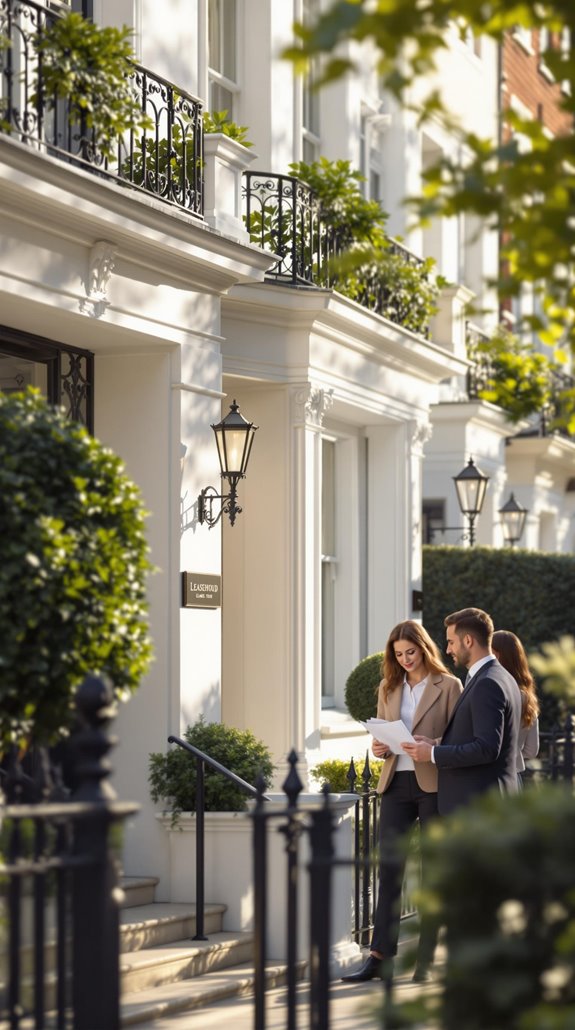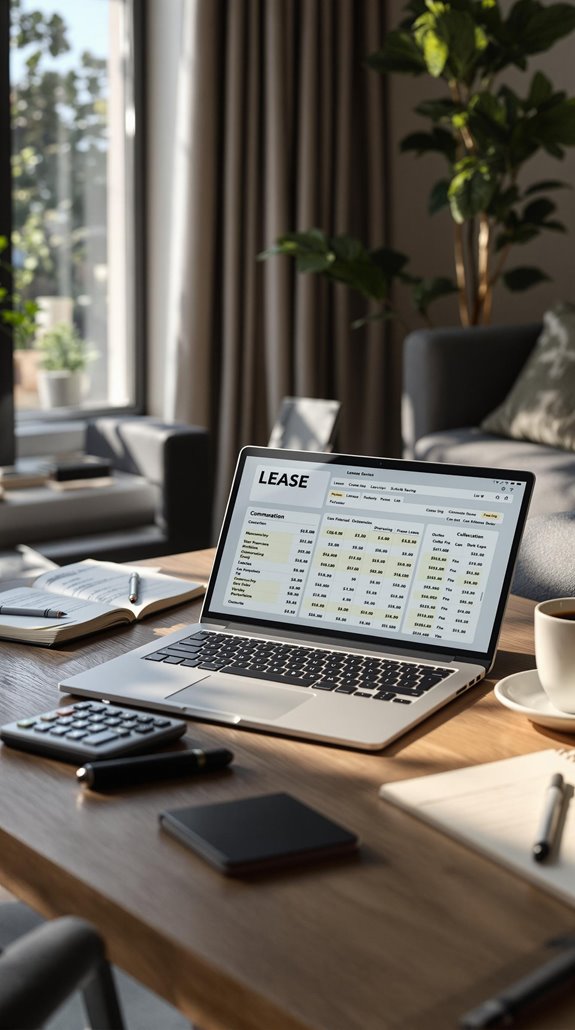I’ll walk you through the real costs of extending your flat’s lease, because the figures you’ll encounter can vary dramatically depending on your specific situation. While you might see estimates ranging from £5,000 to £12,000, I’ve found that many leaseholders face unexpected expenses that push their total costs well beyond these initial projections. The key lies in understanding exactly which factors drive these costs up—and more importantly, how you can potentially minimize them before it’s too late.
Key Takeaways
- Average lease extension costs £7,022, with typical ranges between £8,000-£12,000 including premium payments and professional fees.
- Premium calculations include reversion, ground rent, and marriage value, with costs rising significantly when leases drop below 80 years.
- Professional fees for solicitors and surveyors cost £2,000-£4,000, plus VAT at 20% on all services required.
- London and Southeast properties face premiums 20-50% higher than Northern England and Wales due to regional variations.
- 2025 reforms eliminate freeholder legal fees and reduce ownership requirements, potentially lowering overall extension costs for leaseholders.
Average Lease Extension Costs Across the UK

When extending a lease on a flat in the UK, you’ll face an average total cost of £7,022, though this figure varies considerably based on your property’s value and remaining lease term. I’ve found that costs typically start at a minimum of £5,000, with many leaseholders paying between £8,000-£12,000 for thorough extensions. Understanding ground rent can be essential in managing overall costs effectively.
The total breaks down into several components: the premium paid to your freeholder represents the largest expense, while professional fees for solicitors and surveyors range from £2,000-£4,000. You’ll also cover your freeholder’s reasonable costs. It’s crucial to act before your lease drops below 70 years, as this can severely impact your property’s marketability and available mortgage options.
For context, extending a £200,000 flat’s lease by 90 years averages around £5,000, while a £350,000 property with 85 years remaining could cost £8,000-£12,000 total. These figures help you budget effectively for this significant investment.
Premium Calculations Based on Property Value and Lease Term
Understanding your lease extension premium requires grasping how surveyors calculate the compensation you’ll owe your freeholder based on three core components: reversion, ground rent, and marriage value. I’ll break down exactly what you’re paying for.
Reversion represents your landlord’s future interest in your property at lease end, calculated using projected market values. Ground rent compensation covers their lost annual income over your remaining lease term. Marriage value—the property’s increased worth from extending—gets split equally between you and your freeholder, but only applies when you’ve got 80 years or fewer remaining. It’s important to consider other potential costs, such as hidden fees that can arise during the leasehold purchase.
Your property’s current market value directly influences these calculations. Higher valuations mean steeper premiums. The deferment rate converts future values to present-day terms, while relativity factors adjust valuations based on your lease length. Remember that professional fees for surveyors and solicitors will add to your total costs beyond the premium itself.
Professional Fees Breakdown for Surveyors and Solicitors

Beyond the premium you’ll pay your freeholder, lease extension involves substantial professional fees that typically add £2,000–£4,000 to your total costs. You’ll need a specialist valuation surveyor (£600–£900) to calculate your premium and negotiate with the freeholder’s surveyor (another £600–£900 you’ll reimburse). Your solicitor’s fees run £800–£1,300 for legal drafting and completion oversight, while you’ll also cover the freeholder’s solicitor costs at similar rates. Understanding the legal processes involved will help you navigate these expenses more effectively.
I recommend securing fixed-fee arrangements where possible—80% of solicitors offer them. Add £65 for Land Registry registration and potential tribunal fees if disputing unreasonable freeholder charges. The entire conveyancing process typically takes 3-6 months from start to completion. Remember, you’re only liable for the freeholder’s “reasonable” costs directly related to your extension. Smart negotiation can reduce total professional fees by 15–20%.
Critical Lease Length Thresholds That Impact Your Costs
While professional fees represent predictable costs you can budget for, your lease’s remaining term creates dramatic cost variations that can make or break your extension’s financial viability. I’ll break down the critical thresholds that directly impact your wallet.
The 80-year mark represents your most expensive boundary. Once your lease drops below this threshold, you’ll face marriage value charges—essentially paying the freeholder 50% of your property’s increased value from extension. This single factor can inflate costs by 20-50%.
Between 70-85 years, mortgage eligibility becomes problematic. Most lenders won’t approve loans below 70 years, making your property unmortgageable and reducing its value by 25-40%. However, extending above 80 years restores mortgage eligibility while avoiding marriage value entirely.
The extension process typically requires 3 to 12 months to complete, so timing your application becomes crucial when approaching these critical thresholds.
Marriage Value Explained and When It Applies
Although marriage value sounds like a relationship concept, it’s actually a punitive financial mechanism that can double your lease extension costs. I’ll explain how this applies to your situation.
Marriage value represents the property’s increased worth after merging your leasehold interest with the freeholder’s interest. It only kicks in when your lease drops below 80 years – above this threshold, there’s zero marriage value. This is important to consider because leases, including 999-year leases, may impact your property’s value differently.
Here’s what you’ll pay: the freeholder receives 50% of the calculated marriage value, which equals your property’s post-extension value minus its current value. This can add tens of thousands to your premium and markedly reduces your flat’s marketability. Marriage value is also known as synergistic value in property valuation circles.
The costs escalate dramatically as your lease shortens. That’s why I recommend extending before hitting the 80-year mark to avoid this expensive penalty entirely.
Regional Cost Variations and Location Factors
Your flat’s location profoundly impacts lease extension costs, with London and Southeast properties facing premiums that can exceed regional equivalents by 20-50%. I’ve found that Central London postcodes carry the steepest surcharges due to land value density, while Northern England and Wales typically offer 10-25% lower baseline premiums.
Professional fees vary greatly too. London surveyors charge £800-£2,500 versus £500-£1,500 elsewhere, and legal fees average £3,000-£5,000 compared to £1,500-£3,000 regionally. Urban areas command 15-30% higher premiums than rural locations for comparable lease lengths. Properties with leases below 80 years face significantly increased costs due to marriage value calculations, making timing crucial regardless of location.
You’ll face additional regional complexities: Welsh extensions require bilingual documentation (adding £200-£500), conservation areas trigger heritage assessments (£500-£2,000), and coastal zones may need geological surveys (£300-£800). Understanding these location-specific factors helps you budget accurately.
Complete Fee Structure From Start to Finish

Five distinct cost categories comprise your lease extension budget, each carrying mandatory and optional elements that directly impact your total expenditure.
Your premium payment forms the largest component, calculated from property value, remaining lease years, and ground rent. I’ll typically see £6,000–£8,000 for a £350k flat with 85 years remaining, though costs spike dramatically below 80 years due to marriage value requirements. Understanding the implications of solicitor fees can also help in managing your budget effectively.
Professional services include mandatory surveyor fees (£800–£1,500) and legal costs (£2,000–£4,000). I’d recommend budgeting for both sides’ solicitor fees upfront.
Statutory charges cover your Section 42 notice preparation (£100–£300) and Land Registry updates (£40–£140). VAT applies to all professional services at 20%. The Government-funded Leasehold Advisory Service provides a lease extension calculator to help estimate your specific costs.
Most lenders allow mortgage extensions to cover these costs, making the process more accessible for our community.
Upcoming Leasehold Reform Changes for 2025
Major legislative changes will reshape lease extension costs and processes throughout 2025, fundamentally altering the financial landscape you’ve been traversing.
The Leasehold and Freehold Reform Act 2024 brings substantial savings to your extension calculations. You’ll no longer shoulder freeholder legal and valuation fees, eliminating thousands in additional costs. The two-year ownership rule disappears on 31 January 2025, letting you extend immediately after purchase. This change also aims to alleviate the challenges faced by leaseholders when dealing with an absent freeholder, ensuring smoother transitions during the extension process.
You’ll access 990-year extensions instead of the previous 90-year standard, providing virtually freehold-equivalent security. Ground rent drops to zero for most new leases under the 2022 Act, while standardized premium calculations replace complex negotiations.
These reforms create a more predictable, affordable framework. You’ll benefit from transparent processes, reduced costs, and stronger ownership rights as commonhold becomes the preferred tenure model. The government’s commitment to ending the feudal leasehold system represents a fundamental shift toward fairer housing practices.
Cost-Saving Strategies to Minimize Your Extension Expenses

While lease extension costs can seem intimidating, strategic approaches can greatly reduce your total expenses without compromising the quality of your transaction.
I’ve found that negotiating the premium directly with your freeholder often yields the best results. Professional surveyors can reduce premiums by 10-20% through skilled negotiation and independent valuations. You’ll want to minimize professional fees by obtaining quotes from multiple specialists and bundling services for package discounts.
Timing is essential—extending above 80 years avoids marriage value, potentially saving you thousands. Don’t hesitate to challenge inflated freeholder claims by disputing excessive valuations and requiring itemized cost breakdowns.
Streamlining your process through complete documentation submission and coordinated professional services accelerates timelines while reducing administrative costs. With the upcoming Leasehold and Freehold Reform Act changes expected by 2026, these strategies remain valuable for current extensions while awaiting potential cost reductions. These proven strategies help fellow leaseholders achieve extensions without breaking the bank.
Statutory Vs Informal Extension Routes and Their Costs
When extending your lease, you’ll face a critical decision between two distinct pathways: the statutory route under the Leasehold Reform, Housing and Urban Development Act 1993, or informal negotiations directly with your freeholder.
The statutory route guarantees 90 years plus zero ground rent but costs £7,000+ on average. Your freeholder can’t refuse once you’ve served notice after two years’ ownership. However, you’ll pay their legal costs alongside your own £4,000+ fees. This option can significantly enhance your property’s marketability due to the increased lease length.
Informal negotiations offer flexibility and potentially lower costs around £5,000, but your freeholder controls the terms and can withdraw anytime. Remember that extending before your lease term drops below 80 years is particularly advisable to avoid significantly higher costs. I’d recommend statutory protection if your lease approaches 80 years, where marriage value kicks in. Above 80 years, informal routes often prove more economical and faster.
Conclusion
I’ve outlined the key costs you’ll face when extending your flat’s lease, from the £5,000-£12,000 total expense to critical timing thresholds. You’ll need to budget for premiums, professional fees, and potential marriage value if you’re below 80 years. Don’t wait—costs escalate dramatically as your lease shortens. Use the statutory route for predictable fees, consider collective extensions for savings, and monitor upcoming 2025 reforms that’ll impact your strategy and costs.
References
- https://hoa.org.uk/advice/guides-for-homeowners/for-owners/should-i-extend-my-lease/
- https://hoa.org.uk/advice/guides-for-homeowners/for-owners/lease-extension-costs/
- https://www.comparemymove.com/guides/conveyancing/extending-a-lease-cost
- https://www.theadvisory.co.uk/conveyancing/lease-extension-guide/
- https://www.checkatrade.com/blog/cost-guides/lease-extension-cost/
- https://www.apassociates.org/how-much-does-it-cost-to-extend-a-lease-unveiling-the-factors-and-process/
- https://www.henriquesgriffiths.com/site/blog/hq-blog/how-much-does-it-cost-to-extend-a-lease
- https://www.freehold-sale.co.uk/calculators/lease-extension-calculator/
- https://www.netlawman.co.uk/ia/lease-extension-valuation
- http://www.lease-advice.org/advice-guide/lease-extension-valuation/

